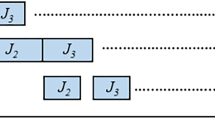Abstract
We consider a scheduling problem on a single machine to minimize the makespan. The processing conditions are subject to cumulative deterioration, but can be restored by a single maintenance. We link the problem to the Subset-sum problem (if the duration of maintenance is constant) and to the Half-Product Problem (if the duration of maintenance depends on its start time). For both versions of the problem, we adapt the existing fully polynomial-time approximation schemes to our problems by handling the additive constants.
Similar content being viewed by others
References
Badics, T., & Boros, E. (1998). Minimization of Half-Products. Mathematics of Operations Research, 33, 649–660.
Biskup, D. (2008). A state-of-the-art review on scheduling with learning effects. European Journal of Operational Research, 188, 315–329.
Erel, E., & Ghosh, J. B. (2008). FPTAS for Half-Products minimization with scheduling applications. Discrete Applied Mathematics, 156, 3046–3056.
Gawiejnowicz, S. (2008). Time-dependent scheduling. Berlin: Springer.
Gordon, V. S., Potts, C. N., Strusevich, V. A., & Whitehead, J. D. (2008). Single machine scheduling models with deterioration and learning: handling precedence constraints via priority generation. Journal of Scheduling, 11, 357–370.
Hochbaum, D. S., & Hong, S.-P. (1995). About strongly polynomial time algorithms for quadratic optimization over submodular constraints. Mathematical Programming, 69, 269–309.
Jurisch, B., Kubiak, W., & Józefowska, J. (1997). Algorithms for minclique scheduling problems. Discrete Applied Mathematics, 72, 115–139.
Katoh, N., & Ibaraki, T. (1998). Resource allocation problems. In D.-Z. Du & P. M. Pardalos (Eds.), Handbook of combinatorial optimization (Vol. 2, pp. 159–260). Dordrecht: Kluwer.
Kellerer, H., & Strusevich, V. A. (2010a). Fully polynomial approximation schemes for a symmetric quadratic knapsack problem and its scheduling applications. Algorithmica, 57, 769–795.
Kellerer, H., & Strusevich, V. A. (2010b). Minimizing total weighted earliness-tardiness on a single machine around a small common due date: An FPTAS using quadratic knapsack. International Journal of Foundations of Computer Science, 21, 357–383.
Kellerer, H., & Strusevich, V. A. (2012). The symmetric quadratic knapsack problem: approximation and scheduling applications. 4QR, 10, 111–161.
Kellerer, H., Mansini, R., Pferschy, U., & Speranza, M. G. (2003). An efficient fully polynomial approximation scheme for the Subset-Sum Problem. Journal of Computer and System Sciences, 66, 349–370.
Kellerer, H., Pferschy, U., & Pisinger, D. (2004). Knapsack problems. Berlin: Springer.
Koulamas, C., & Kyparisis, G. J. (2007). Single-machine and two-machine flowshop scheduling with general learning functions. European Journal of Operational Research, 178, 402–407.
Kovalyov, M. Y., & Kubiak, W. (1998). A fully polynomial approximation scheme for minimizing makespan of deteriorating jobs. Journal of Heuristics, 3, 287–297.
Kubiak, W. (1995). New results on the completion time variance minimization. Discrete Applied Mathematics, 58, 157–168.
Kubzin, M. A., & Strusevich, V. A. (2005). Two-machine flow shop no-wait scheduling with machine maintenance. 4OR, 3, 303–313.
Kubzin, M. A., & Strusevich, V. A. (2006). Planning machine maintenance in two-machine shop scheduling. Operations Research, 54, 789–800.
Kuo, W.-H., & Yang, D.-L. (2006a). Minimizing the makespan in a single machine scheduling problem with a time-based learning effect. Information Processing Letters, 97, 64–67.
Kuo, W.-H., & Yang, D.-L. (2006b). Minimizing the total completion time in a single-machine scheduling problem with a time-dependent learning effect. European Journal of Operational Research, 174, 1184–1190.
Kuo, W.-H., & Yang, D.-L. (2008). Minimizing the makespan in a single-machine scheduling problem with the cyclic process of an aging effect. Journal of the Operational Research Society, 59, 416–420.
Lee, C.-Y., & Leon, V. J. (2001). Machine scheduling with a rate-modifying activity. European Journal of Operational Research, 128, 119–128.
Lodree, E. J. Jr., & Geiger, C. D. (2010). A note on the optimal sequence position for a rate-modifying activity under simple linear deterioration. European Journal of Operational Research, 201, 644–648.
Mosheiov, G., & Sidney, J. B. (2010). Scheduling a deteriorating maintenance activity on a single machine. Journal of the Operational Research Society, 61, 882–887.
Rustogi, K., & Strusevich, V. A. (2012). Single machine scheduling with general positional deterioration and rate-modifying maintenance. Omega, 40, 791–804.
Wu, C.-C., Yin, Y., & Cheng, S.-R. (2011). Some single-machine scheduling problems with a truncation learning effect. Computers & Industrial Engineering, 60, 790–795.
Yang, S.-J., & Yang, D.-L. (2010). Minimizing the makespan single-machine scheduling with aging effects and variable maintenance activities. Omega, 38, 528–533.
Zhao, C.-L., & Tang, H.-Y. (2010). Single machine scheduling with general job-dependent aging effect and maintenance activities to minimize makespan. Applied Mathematical Modelling, 34, 837–841.
Acknowledgements
The first and third authors were partly supported by the EPSRC funded project EP/I018441/1 “Quadratic and Linear Knapsack Problems with Scheduling Applications”.
Author information
Authors and Affiliations
Corresponding author
Rights and permissions
About this article
Cite this article
Kellerer, H., Rustogi, K. & Strusevich, V.A. Approximation schemes for scheduling on a single machine subject to cumulative deterioration and maintenance. J Sched 16, 675–683 (2013). https://doi.org/10.1007/s10951-012-0287-8
Published:
Issue Date:
DOI: https://doi.org/10.1007/s10951-012-0287-8




